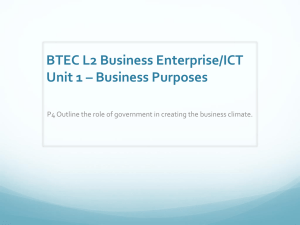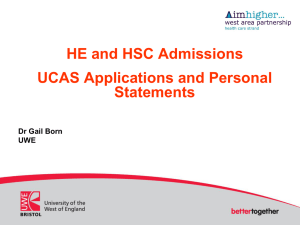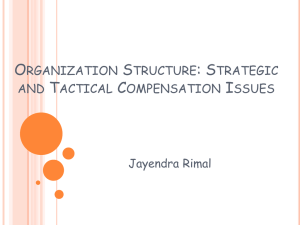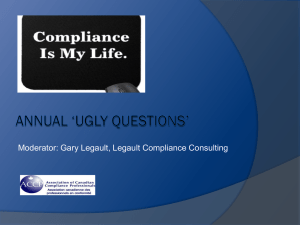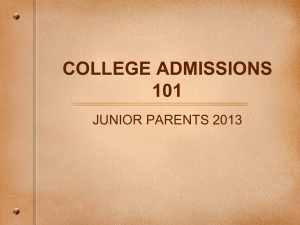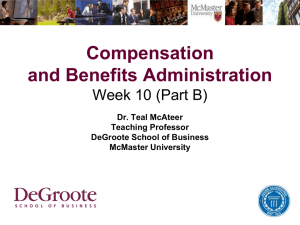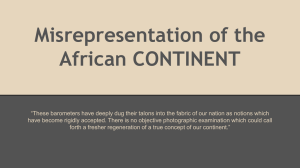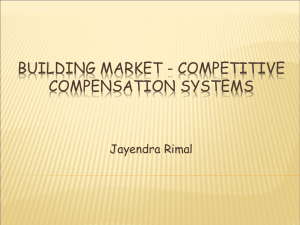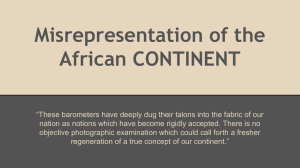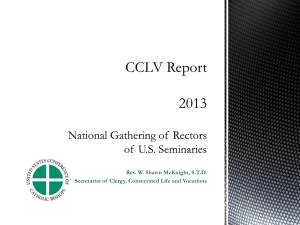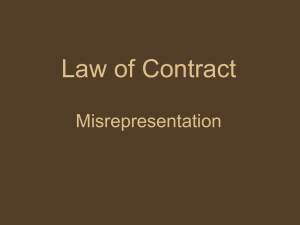view the presentation slides (PPT)
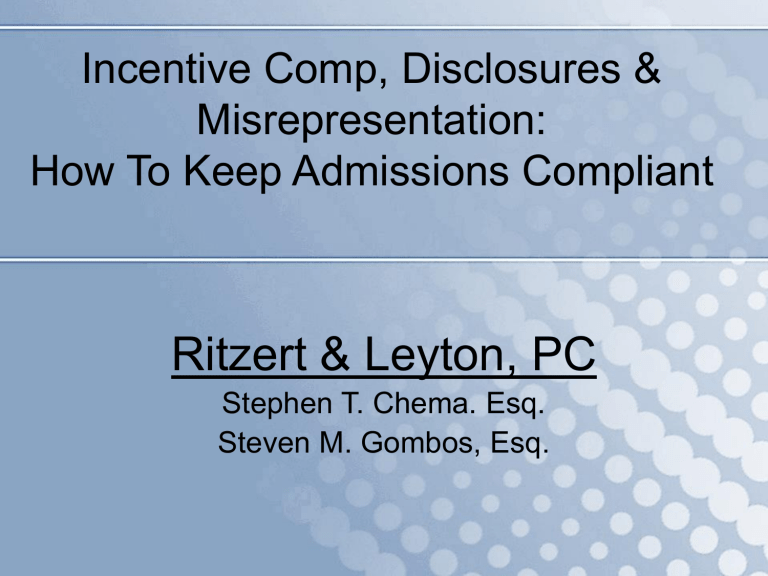
Incentive Comp, Disclosures &
Misrepresentation:
How To Keep Admissions Compliant
Ritzert & Leyton, PC
Stephen T. Chema. Esq.
Steven M. Gombos, Esq.
Disclaimers
• The views expressed in this presentation and its accompanying materials are those of the speaker, and do not necessarily reflect those of Private
Career Colleges.
• The contents of this presentation and its accompanying materials do not constitute legal or regulatory advice. No one should act or refrain from acting on the basis of this presentation without seeking individualized, professional counsel as appropriate.
1/23/2012 Ritzert & Leyton, PC 2
Introduction
• This session focuses on the admissions and recruiting practices and is designed to provide school owners and administrators with a brief discussion of applicable law and to provide insight into some basic strategies for compliance with:
– The Incentive Compensation Rule
– Mandatory Public Disclosures
– Misrepresentation
1/23/2012 Ritzert & Leyton, PC 3
Incentive Compensation
• Rule prevents payment of “any commission, bonus, or other incentive payment based in any part, directly or indirectly, upon success in securing enrolment, or the award of financial aid
”.
• Any person engaged in any student recruitment or admissions activity is a covered person under the rule.
• Commission, bonus, or other incentive payment = money or something of value, other than a fixed salary or wages, paid to or given to a person or entity for services rendered.
• Prior “safe harbors” have been eliminated.
1/23/2012 Ritzert & Leyton, PC 4
Incentive Compensation
• What you already knew: Admissions Reps are
Covered.
Covered Activities
Activities that are ALWAYS subject to the ban on incentive compensation
Exempt Activities
Activities not subject to the ban on incentive compensation include the following, unless the activities of the employee or entity also involve a covered activity.
Recruitment activities, including:
Targeted information dissemination to individuals;
Solicitations to individuals;
Contacting potential enrollment applicants; aiding students in filling out enrollment application information
1/23/2012
Marketing Activities, including:
Broad information dissemination;
Advertising programs that disseminate information to groups of potential students;
Collecting contact information;
Screening pre-enrollment information to determine whether a prospective student meets the requirements that an institution has established for enrollment in an academic program;
Determining whether an enrollment application is materially complete, as long as the enrollment decision remains with the institution
Ritzert & Leyton, PC 5
Incentive Compensation
• Also covered: any higher level employee with responsibility for recruitment or admissions of students.
– Director of Admissions
– Senior Management (V.P. of Admissions, Campus
Directors/Presidents, etc.) depending on the nature of their activities
• Policy decisions related to the manner in which recruitment, enrollment, or financial aid will be pursued or provided = exempt activity.
1/23/2012 Ritzert & Leyton, PC 6
Incentive Compensation
• How can an institution implement a compliant compensation plan for Admissions?
– Under the rule, institutions are still permitted to make make merit-based adjustments to employee compensation provided that such adjustments are not based in any part, directly or indirectly, upon success in securing enrollments.
• Standard evaluative factors: job knowledge, professionalism, analytic ability, initiative in work improvement, clarity in communications, use & understanding of technology, accuracy, thoroughness, dependability, punctuality, adaptability, peer rankings, student evaluations, and interpersonal relations.
– Two salary adjustments in a 12 month period is prima facie evidence of a violation.
1/23/2012 Ritzert & Leyton, PC 7
Incentive Compensation
“ The Department has been repeatedly advised by institutional employees that these other qualitative factors are not really considered when compensation decisions are made, and that they are identified only to create the appearance of title IV compliance. It is clear from this information that institutions are making actual compensation decisions based exclusively on the numbers of students enrolled .” 75 FR 66873.
“ To be sure, any enforcement action by the Department will require examination of the relevant documents and evidence ”
– Government’s brief on appeal, APSCU v Arne Duncan.
1/23/2012 Ritzert & Leyton, PC 8
Incentive Compensation
• Establishing a compliant compensation plan is only half the battle. You must apply the plan consistently to all admissions employees and you must carefully document the basis of all your compensation decisions.
• Monitor and review the salary review process while it is ongoing.
• Regularly analyze the results from your salary reviews.
1/23/2012 Ritzert & Leyton, PC 9
Incentive Compensation
• Additional ideas to consider:
– Employer contributions to profit sharing plans such as
401(k) plans which are made to individuals on a basis that is neutral with respect to the role the recipient plays in student recruitment
– Employee benefits plans offered to all employees on a basis that is neutral with respect to the role the recipient plays in student recruitment
– Compensation adjustments based upon seniority
1/23/2012 Ritzert & Leyton, PC 10
Disclosures
• There are an abundance of required disclosures that are aimed at prospective students. (We have identified over 33 different categories of required disclosures for Title IV institutions generally.)
• 668.41 definition of prospective student: an individual who has contacted an eligible institution requesting information concerning admission to that institution.
• As the main point-of-contact with prospective students, admissions reps need to know, at minimum, how to provide required disclosures.
1/23/2012 Ritzert & Leyton, PC 11
Disclosures
• Depending on which disclosure is involved, the
Department requires institutions either to:
– Provide the required disclosure, e.g. – hand a packet of information to prospective student at an interview; or
– Make the information contained in the disclosure available to prospective students. i.e., print in school publications, mailings, or post on the school’s website.
1/23/2012 Ritzert & Leyton, PC 12
Disclosures
• Examples of disclosures which must be made directly to a prospective student:
– Gainful Employment Disclosures
• Occupations & SOC Codes
• On-time graduation rate
• Tuition & fees
• Placement Rates
• Median loan debts
– Campus Crime Notice
• A notice of the report’s availability
• Description of the contents
• Information on how to request a copy (including URL if posted online).
1/23/2012 Ritzert & Leyton, PC 13
Disclosures
• Examples of disclosures which must be made available to a prospective student:
– Institutional Cost of Attendance & Additional Cost of a program in which the prospective student expresses interest
– Refund & R2T4 Policies
– Academic/Program Information
– Institutional Policy Regarding Copyright Infringement
– Description services and facilities available to students with disabilities
– Transfer of Credit Policies
1/23/2012 Ritzert & Leyton, PC 14
Disclosures
• Schools should annually audit their disclosures to make sure:
– Is the information accurate and up to date?
– Are the School’s disclosures delivered the correct way?
• E.g., are GE disclosures given to all prospective students and appropriately posted on the website and included on promotional materials?
– Are admissions personnel conversant with the content of the disclosures?
• Can they answer basic questions about the information?
– E.g., can they interpret the School’s net price calculator for a student who has questions about it?
• Do they know to whom they can refer questions that they do not know how to answer?
1/23/2012 Ritzert & Leyton, PC 15
Disclosures
• Failure to provide (or make available) required disclosures impacts on an institution’s administrative capability and worse…
1/23/2012 Ritzert & Leyton, PC 16
Misrepresentation
• 34 CFR 668 Subpart F prohibits institutions from making a “substantial misrepresentation” about the nature of its educational program, financial charges, employability of graduates, or relationship with ED.
17 1/23/2012 Ritzert & Leyton, PC
Misrepresentation
• The regulation provides for a variety of sanctions:
– Revocation of school’s PPA
– Limitations on school’s participation in Title IV
– Denial of participation applications made on behalf of the school
– Fine or Termination actions
1/23/2012 Ritzert & Leyton, PC 18
Misrepresentation
“Any false, erroneous or misleading statement an eligible institution, one of its representatives, or any ineligible institution, organization, or person with whom the eligible institution has an agreement to provide educational programs, or to provide marketing, advertising, recruiting or admissions services makes directly or indirectly to a student, prospective student or any member of the public, or to an accrediting agency, to a State agency, or to the Secretary. A misleading statement includes any statement that has the likelihood or tendency to deceive or confuse. A statement is any communication made in writing, visually, orally, or through other means. Misrepresentation includes the dissemination of a student endorsement or testimonial that a student gives either under duress or because the institution required the student to make such an endorsement or testimonial to participate in a program.”
34 C.F.R. § 668.71(c).
1/23/2012 Ritzert & Leyton, PC 19
Misrepresentation
• The definition is extremely broad and can describe
“innocent” conduct of the institution.
– Can include statements that are inaccurate or confusing but does not require that the speaker intended to make a misrepresentation.
• The definition of prospective student is also broadened, for the purposes of the misrepresentation regulation:
– Prospective student: “Any individual who has contacted an eligible institution for the purpose of requesting information about enrolling in the institution or who has been contacted directly by the institution through advertising about enrolling at the institution.
1/23/2012 Ritzert & Leyton, PC 20
Misrepresentation
Misrepresentations Related to the Nature of an Educational Program can involve
(among other things):
• Accreditation (Type, Nature, Status)
• Transferability of credits
• Whether successful completion of course qualifies student for union membership, licensure or certification, or meets conditions generally needed to secure employment in the occupation
• Requirements for completion of the program (including grounds for terminating enrollment).
• Availability, frequency, and appropriateness of courses and programs to employment objectives
• Nature, age, and availability of training devices or equipment
• Availability of part-time employment or other forms of financial assistance
• Nature and availability of any tutorial or other supplementary assistance needed before, during or after course completion
• Nature or extent of any prerequisites for enrollment in any course
• Subject matter, content of course of study, or any other fact related to the credential awarded upon completion of course of study
• Whether academic, professional, or occupational degree conferred has been authorized by appropriate
State agency
• Matters required to be disclosed under 34 C.F.R. 668.42 (Financial Aid) & 668.43 (School Information)
1/23/2012 Ritzert & Leyton, PC 21
Misrepresentation
Misrepresentations Related to the Nature of
Financial Charges can involve:
• Offers of scholarships
• Whether particular charge is customary charge
• Cost of program and refund policy
• Availability or nature of financial assistance
• Duty to repay loans regardless of whether student completes program or obtains employment
• Student’s right to reject financial aid or other assistance or whether student must apply for particular type of aid
1/23/2012 Ritzert & Leyton, PC 22
Misrepresentation
Misrepresentations Related to the Nature of Employability of
Graduates can involve:
• Institution’s relationship with any organization, employment agency, or other agency providing authorized training leading directly to employment
• Institution’s plans to maintain placement services for graduates or otherwise assist in obtaining employment
• Institution’s knowledge about current or likely future conditions, compensation, or employment opportunities in industry
•
Whether employment is being offered by institution or that a talent hunt/contest is being conducted
• Government job statistics in relation to potential placement
• Other requirements generally needed to be employed:
– commercial driving licenses
– license to carry firearms
– failing to disclose factors that would prevent applicant from qualifying for such requirements, such as existing prior criminal record or preexisting medical conditions
1/23/2012 Ritzert & Leyton, PC 23
Misrepresentation
Misrepresentations Related to the Nature of the
Relationship with ED can involve:
• Statements made by school or third-party describing School’s educational content or programs in a manner suggesting approval or endorsement by ED.
24 1/23/2012 Ritzert & Leyton, PC
Misrepresentation
Because the scope of the misrepresentation rule has become so broad, and because of the potentially severe nature of the Department’s sanctions, schools must have a proactive compliance strategy.
1/23/2012 Ritzert & Leyton, PC 25
Misrepresentation
• Regularly audit all disclosure materials to ensure that all information is up-to-date and current.
– Have a “ready response” team so that updates to items on the School’s website can be made in a timely fashion.
• Review training materials for admissions employees to make sure that admissions phone scripts and interview scripts are compliant.
• Evaluate all fact sheets, advertising and marketing collateral, and other materials that are provided to a prospective student during a visit to the school.
1/23/2012 Ritzert & Leyton, PC 26
Misrepresentation
• Make sure that all new employees to admissions department receive sufficient training to understand what a substantial misrepresentation is, as well as the potential consequences.
• Periodically re-train existing employees to emphasize the need for compliance.
– Conduct mock admissions interviews to test an employee job knowledge and knowledge of the rule.
1/23/2012 Ritzert & Leyton, PC 27
Misrepresentation
• Consider monitoring admissions telephone calls to assess compliance.
• Consider using “secret shoppers” to assess compliance during interviews.
• Draft templates for written communications between admissions staff and prospective students.
• Require that written communications between admissions staff and prospective students be
“cleared” by management prior to sending.
1/23/2012 Ritzert & Leyton, PC 28
Misrepresentation
• Obtain photo release from each student from whom you intend to use in visual advertising and obtain a statement of approval from all students who you ask to provide a testimonial for marketing purposes.
29 1/23/2012 Ritzert & Leyton, PC
Q&A
We would be happy to take any questions which you were unable to raise during the presentation.
If you have additional questions or wish to follow-up with us later, please contact us:
Stephen T. Chema
Gombos
Steven M. stchema@ritzert-leyton.com
sgombos@ritzert-leyton.com
703-934-9834 (direct)
703-934-9826 (direct)
1/23/2012 Ritzert & Leyton, PC 30
